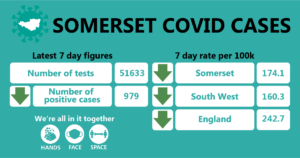This update is provided by the Somerset Covid-19 Engagement Board and is designed to provide a weekly update on the current Covid-19 situation in Somerset.
This update is provided by the Somerset Covid-19 Engagement Board and is designed to provide a weekly update on the current Covid-19 situation in Somerset.
A ‘major milestone’ has been met this week as the number of first doses of the Covid-19 vaccine offered to people in the South West went past one million. The regional milestone was celebrated here in Somerset at the vaccination centre at the Taunton Racecourse. It really is a fantastic achievement and worthy of celebration.
However, we still need to reinforce the important message that while the vaccine is designed to prevent serious illness and death from Covid-19, anyone who has received the vaccine could still catch coronavirus and might still be able to pass it on to others. It takes between two and three weeks to build protection once you have had the vaccine, it isn’t instant protection. Therefore, we urge you to please keep adhering to the ‘Hands-Face-Space’ guidance in order to protect yourselves and others.
Sadly, we have also reached another milestone this week, where we have recorded the highest number of deaths in Somerset in one seven-day period. Sadly, a further 63 of our fellow residents have lost their lives, and our deepest sympathies are with their loved ones.
Testing is an important part of our fight against the spread of coronavirus, especially as one third of the people that catch it have no symptoms at all. This means that they can spread the virus without knowing, including to people who could become seriously ill. One type of test available is Lateral Flow Tests or LFTs. Locally, this testing is currently only available to specific groups that cannot work from home and are in contact with our most vulnerable residents most at risk of becoming seriously ill from Covid-19. The national programme is supporting other settings with this offer such as schools, certain business and care homes. This type of test is very good at identifying people who have lots of the virus, and are infectious on the day, but isn’t as good at finding the virus in people who aren’t infectious yet (i.e. early in the infection) therefore it is very important to note that it is possible to receive a negative test, but actually be carrying the virus.
For this reason, anyone using LFT tests should ideally be tested twice a week and should also keep adhering to the ‘Hands-Face-Space’ guidance and remember to ventilate households or workplaces.
‘Remember, everyone can catch it, anyone can spread it’.



| David Fothergill, Leader of Somerset County Council Twitter: @DJAFothergill | Trudi Grant, Director of Public Health Twitter: @SomersetDPH | Clare Paul, Cabinet Member for Public Health and Wellbeing Twitter: @Clarepaul_ |
Along with the rest of the UK, locally we are seeing rates coming down, however figures are still high, and Covid-19 is still very much circulating in our communities.
Somerset’s seven-day infection rate has decreased considerably from last week’s rate of 255.2 and now stands at 174.1 new cases per 100,000.
COVID vaccination data to end of 31st January has now been released and shows over 100k 1st vaccinations have been given, this is coverage of 94% of both 75-79 and 80 and over groups.

Between 25 and 31 January, approximately 51,633 tests were carried out across the county and there have been 979 new confirmed cases. The number of tests has increased due to the ramp up of testing (in particular, the rapid testing programme) but importantly, the number of positive cases has reduced since last week’s update.
The Somerset Dashboard which tracks our local epidemic from the start in March, to the current time.
Workplaces: Larger employers in Somerset can now order coronavirus tests for their workforce if they cannot work from home. The direct route for ordering rapid Lateral Flow Tests has been set up for employers with 50 or more staff in England. View the GOV.uk website for more information.
Lateral flow tests are good at identifying people who don’t have symptoms and who may have infection when they may not otherwise have been picked up. However, they do not pick up all infections. This is why following a negative result, it is important that people continue to follow all national guidelines regarding social distancing, wearing face coverings and washing their hands regularly.
The benefit of these tests is that they will identify some asymptomatic or pre-symptomatic positive cases, helping to break transmission chains. The downsides include the relatively high false negative rate, and the significant resources required to test the workforce repeatedly.
Care Sector: In the seven days between 24 and 30 January, there were 156 new cases at 40 care home settings. The positive cases identified were staff and residents; we continue to support these settings with support and guidance on prevention measures. We are extremely pleased that the majority of care home residents have now received their first vaccination, helping to prevent serious illness from Covid-19 within this group.
Schools and Early Years settings: The national lockdown restrictions mean that only vulnerable children and those of key workers are receiving face to face learning, with other groups receiving learning at home and online.
Somerset schools are working hard to implement the Department for Education mass testing programme. Staff at secondary schools, colleges and special schools are now taking part in a twice weekly testing programme. Staff at primary schools and maintained nurseries now have access to home testing kits.
We are seeing some sporadic cases in educational settings and continue to work with schools to undertake risk assessments and provide public health advice.
Communications:
Stay at home restrictions
We remain under a period of national lockdown, and as before, encourage you to share the following poster with your networks to help explain the restrictions: England Lockdown: Stay At Home posters – GOV.UK (www.gov.uk)
This week, we are continuing to reinforce the importance of ventilation in combating Covid-19. Covid-19 spreads from person to person through small droplets, clouds of tiny airborne particles known as aerosols and through direct contact.
In addition to social distancing and other measures, you can also reduce the risk of spreading Covid-19 by:
- Letting plenty of fresh air into your home or room without getting uncomfortably cold if you have people working in or visiting you (only where permitted). You should do this during their visit and after they leave
- Avoid coming into contact with people in spaces with limited flow of fresh air such as rooms with windows that are never opened
To increase the flow of air you can:
- open windows as much as possible
- open doors
- make sure that any vents (for example at the top of a window) are open and airflow is not blocked
- leave extractor fans (for example in bathrooms) running for longer than usual with the door closed after someone has used the room
Join our growing number of Covid community champions
Do you want to help people to stay safe during the Covid-19 pandemic? We don’t want much of your time…
Spark Somerset is working in partnership with SASP (Somerset Activity and Sports Partnership) to set up the Covid Community Champions Network. The network will give local people a role in helping their community to get up to date information and make the right choices to stay healthy.
After attending a short online training course, Covid Community Champions will be able to help their family, friends and the wider community to understand the latest guidance around Covid-19, and signpost to other health and wellbeing support. This can be done informally as the Champions go about their day to day lives; whether they talk to work colleagues, challenge something they see online, or simply speak to people when out and about (when current national restrictions come to an end). They will play a vital part in helping keep local people informed; helping them to stay healthy, happy and safe.
Champions will have the opportunity to attend regular online meetings, where they’ll get to know the other Champions, keep up to date, and feedback about how things are going where they live and work. We’re particularly keen to involve people living or working with communities that might find it hard to get the right information about how to stay healthy and happy at the moment, and areas where Covid infections rates are highest in Somerset.
If you, or someone you know might be interested in a becoming a Covid Champion, you can find more information and sign up here.
Advisory Network
Do you work with hard to reach or vulnerable groups across Somerset? If you do, please help us by signing up to our Health and Wellbeing Advisory Network.
Feedback from you will help us to deepen our understanding of the Covid-19 related communication and engagement needs of our communities across Somerset, especially our more vulnerable groups.
There are people experiencing real issues and not being reached, we want to get key information out to as many of our residents as possible and a collective effort will help us to do this.
By joining, you can expect to receive regular up to date information on Covid-19 and health impacts across Somerset, opportunities to feedback to us via surveys as well as exclusive access to webinars and communications materials to address specific issues and barriers locally. We currently have a live survey that we would really appreciate you responding to; it should only take a few minutes of your time.
To sign up simply visit the Somerset County Council website.
For more information on the NHS vaccination in Somerset please visit the NHS website.
For more information on the COVID-19 vaccine please visit the NHS website.
As always, please do keep an eye our Healthy Somerset website, which has a huge amount of information and resources to help keep everyone healthy happy and safe at this time.
Finally, please like them on Facebook, follow them on Twitter and share their posts with your networks to help them in communicating these important messages. Follow their Director of Public Health account on Twitter.
Resources and further information: For the latest local information as well as digital resources, posters and flyers please visit the Somerset County Council website.
The Somerset Local Outbreak Management Plan outlines how we, the council, will work with the NHS Test and Trace Service, PHE, the NHS and other partners to ensure a whole system approach to preventing and managing local outbreaks. This can be found here.

